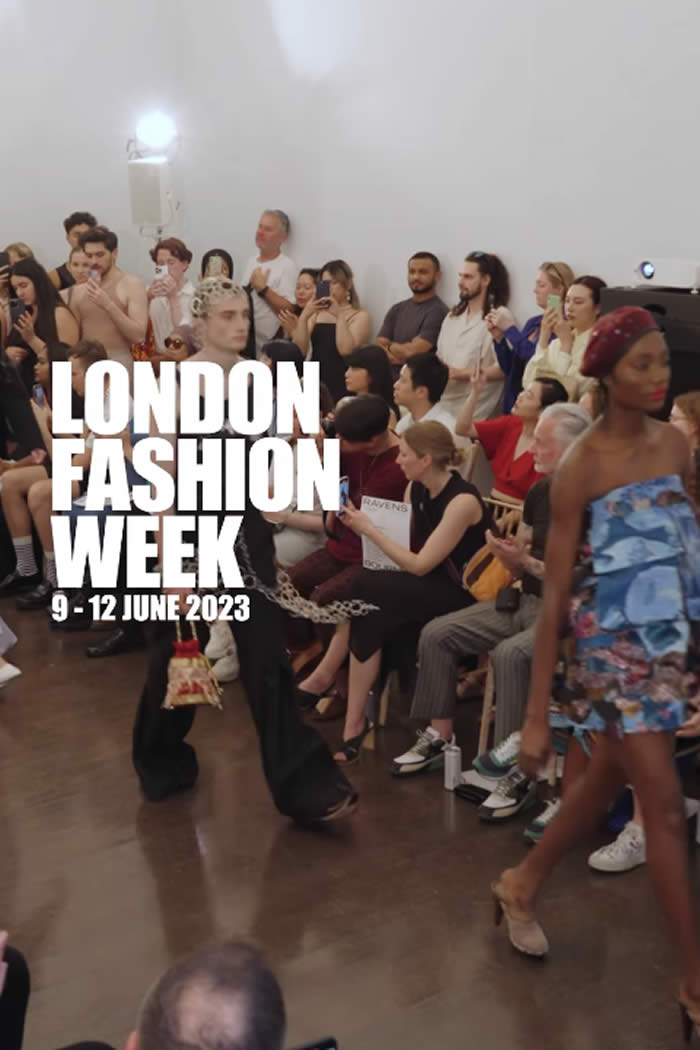London Fashion Week’s latest edition in June 2023 raised questions due to its limited scope compared to previous seasons. However, it showcased a highly hybrid format, combining physical catwalks, digital presentations, and engaging talks and panels over the course of the weekend (June 2 to 5). Despite the participation of only six designers, London embraced this experimental four-day event, fusing technology, culture, and support for emerging British talents.
Typically scheduled in February and September, London’s large-scale fashion weeks have now evolved into a platform that explores the future possibilities of the industry. This edition served as a test bed for the convergence of technology and fashion, while concurrently nurturing rising British designers. The British Fashion Council (BFC) actively repositioned itself by focusing on local talent, aiming to amplify the UK’s fashion industry. The BFC chairman, David Pemsel, outlined this strategic shift in a letter to BFC members prior to the event, signaling the council’s commitment to supporting and promoting homegrown talent.
In his letter, David Pemsel, who assumed the role of chairman in October, expressed his intention to support UK-based brands in navigating the current challenging environment. Factors such as Brexit regulations, the aftermath of the pandemic, and other socioeconomic conditions have posed difficulties for these brands. Pemsel’s key focus areas revolved around fostering commercial and cultural innovation, shaping the narrative of UK fashion, and promoting responsible growth by providing accessible opportunities for emerging talent.
Pemsel’s commitment to supporting new designers was evident in the June edition of London Fashion Week. The event featured the participation of three universities, namely the University of Westminster, Ravensbourne University London, and the University of East London, showcasing their own graduate shows. Additionally, two educational panels were organized, one focusing on the future of menswear and the other exploring the forgotten style tribe of The Asian Man.
The reduced schedule of London Fashion Week was intentionally dedicated to smaller brands and aimed to reach a broader audience, emphasizing a democratization of the platform. In line with the previous rebranding in 2020, the showcase continued to adopt a gender-neutral approach to menswear, with participating designers choosing to exhibit unisex and androgynous styles.
Kicking off the event was Hoor Al Qasimi, the creative director of Qasimi. Her men’s and women’s collection took inspiration from Sudanese artist Kamala Ibrahim Ishaq, evident in the use of earth tones, traditional silk printing, and intricate craftsmanship. Qasimi also utilized this opportunity to showcase the work of two designers from her fashion incubator called ‘Qasimi Rising,’ namely Omer Asim and Salim Azzam.
On the same day, Los Angeles-based menswear brand Justin Cassin made a return to the London Fashion Week schedule. After previously presenting his SS23 collection in London, Cassin opted for an evening show at The Vinyl Factory in Soho for his AW24 collection. Once again, he showcased his unique interpretation of British tailoring, incorporating structured silhouettes and experimental techniques.
Pemsel reiterated his commitment to supporting the industry’s growth in his letter, reinforcing the previous efforts mentioned: “We have unwavering belief in the UK fashion industry, its creative heart beat and London as a global fashion capital. Our businesses are innovators, challengers and provocateurs and our ambitions are too great to be constrained by the small team at the BFC. We as an industry showed our strength as a community through the pandemic, and harnessing that strength in community to collectively do what we all can to contribute to retaining and strengthening our pre-eminent position as creators, innovators and industry trailblazers.”



